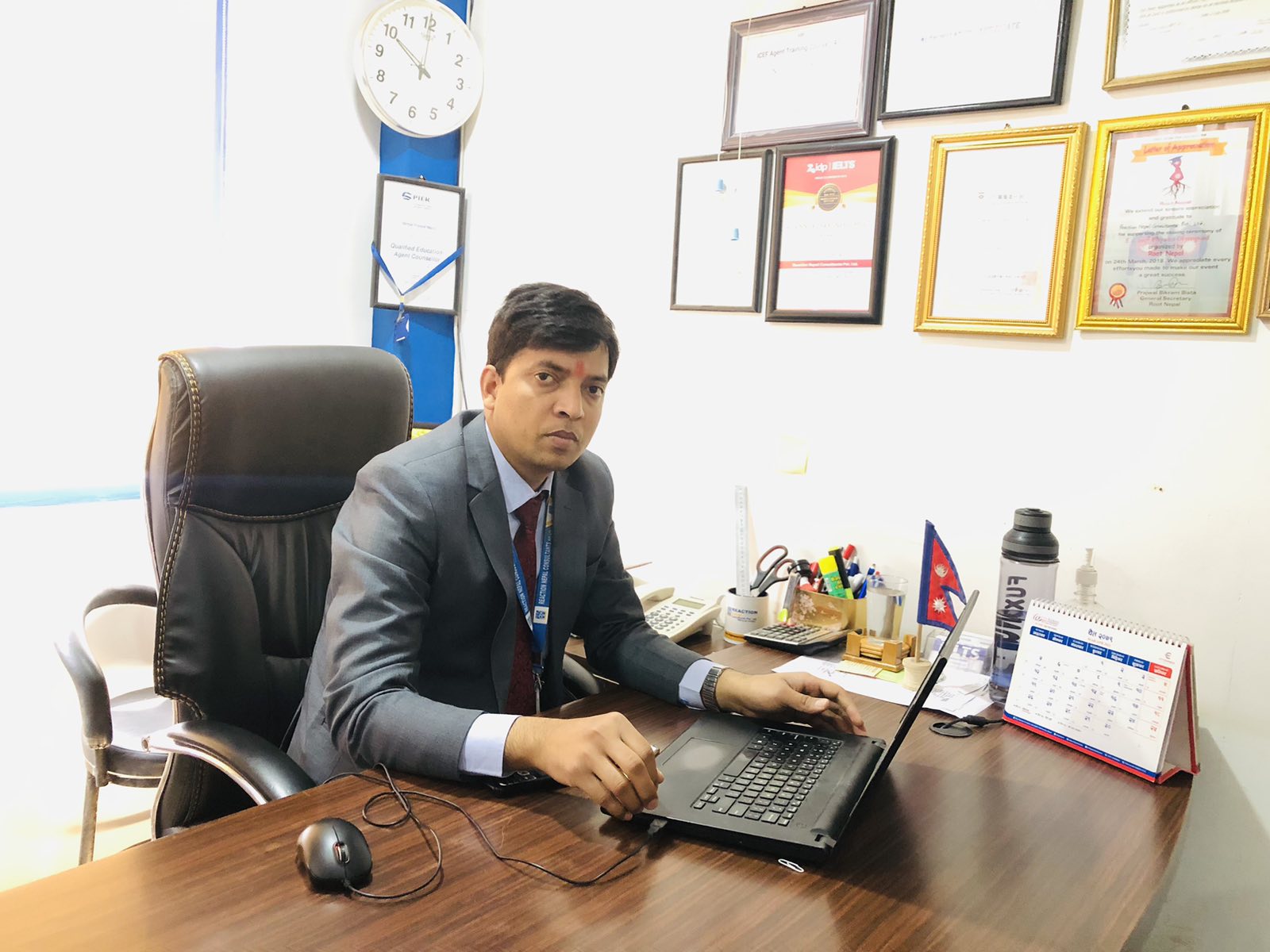CEO
RAJU PRASAD KHANAL
CEO/ChairpersonThe CEO/Chairperson plays a pivotal role in steering the organization towards success and sustainability. Their work involves developing and executing the company's strategic vision, making critical decisions, and overseeing day-to-day operations.
As the top executive, CEOs provide inspirational leadership, setting the tone for the organization's culture and values. They engage with various stakeholders, from employees to investors, maintaining positive relationships and ensuring alignment with the company's mission. Financial oversight, risk management, and policy development are integral components of their responsibilities.
Managing Director
NIRMAL PD. NEPAL
Managing DirectorThe Managing Director (MD) holds a key position in an organization, tasked with the day-to-day management and execution of the company's strategic objectives. Their work involves overseeing various departments, ensuring operational efficiency, and implementing policies to drive the organization's success.
MDs play a crucial role in decision-making, often collaborating with other executives to formulate and execute business plans. They are responsible for maintaining a positive organizational culture, fostering effective communication, and addressing operational challenges. Financial management, resource allocation, and performance monitoring are integral components of the MD's duties.
Official Advisor
PURUSHOTTAM RAJ KHAKUREL
Official AdvisorThe role of an official advisor is primarily focused on providing strategic guidance and expert counsel to an organization. Official advisors are seasoned professionals who bring a wealth of experience and knowledge in a specific field to assist the leadership team in making informed decisions. Their work involves offering insights and recommendations on critical matters such as business strategy, industry trends, and organizational development.
Official advisors may participate in high-level discussions, contribute to problem-solving, and offer mentorship to key executives. While they typically do not have direct operational responsibilities, their influence is valuable in shaping the organization's direction and ensuring that decisions align with best practices and industry standards.
Counsellor
Roshmi Chaulagain
Academic Officer - CanadaAn academic officer in a consulting firm holds a key role in overseeing and managing academic programs, ensuring they align with the consultancy's goals and standards. Responsibilities typically include coordinating with educational institutions, designing curriculum frameworks, and developing training materials. Academic officers may also engage in student recruitment efforts, evaluate academic performance, and implement quality assurance measures.
They collaborate with subject-matter experts to stay updated on industry trends and educational advancements, ensuring the consultancy's offerings remain relevant and effective. Additionally, academic officers often contribute to the development of proposals and client pitches by providing expertise on educational strategies.
Bhabana Pyakurel
Academic officerAs an academic officer in a consultancy, you're not just a facilitator of education; you're a strategic architect shaping the intellectual backbone of our consultancy's services. Your role involves designing and refining cutting-edge academic programs that meet the evolving needs of our clients. You are the curator of knowledge, collaborating with experts to craft learning experiences that transcend traditional boundaries. From student recruitment to quality assurance, you wield your expertise to ensure our educational offerings are not just relevant but transformative.
Your responsibilities extend beyond textbooks and classrooms; you contribute to the consultancy's growth by infusing every proposal and client engagement with an educational edge that sets us apart.
Sabin Budhathoki
Europe CounsellorA Europe Counselor guides students through the study abroad process, helping with university selection, visa applications, and documentation.
Sabin Budhathoki excels in this role with in-depth knowledge, personalized support, and a commitment to student success, ensuring a smooth journey to top European universities.
Sujita Karki
USA - Assistant CounselorUSA Assistant Counselor, plays a vital role in supporting students who aspire to pursue their education in the United States. She guides students through every stage of the study abroad process, including university and program selection, application preparation, documentation, and visa processing. With strong knowledge of the U.S. education system, admission criteria, and institutional requirements, she helps students choose suitable universities based on their academic background, career goals, and financial capacity.
In addition, Sujita Karki provides personalized guidance on preparing application materials such as statements of purpose, recommendation letters, and academic records. She also assists students in understanding standardized test requirements, scholarship opportunities, and important deadlines. By offering continuous support and clear guidance, she ensures students experience a smooth, well-organized, and successful application journey toward studying in the United States.
Nishan Poudel
Assistant Counselor - JapanAn Assistant Counselor – Japan helps students navigate the Japanese study and visa process, offering accurate guidance, personalized advice, and end-to-end application support. Nishan Poudel excels in this role with strong communication skills, cultural understanding, and attention to detail, ensuring each student is fully prepared for a smooth and successful transition to Japan.
Administrative Officer
Bhesh Bahadur Khattri (Kiran)
Branch Manager / Japanese Language InstructorA branch manager serves as the head of a specific branch or location within a larger organization, overseeing its day-to-day operations. Their work involves managing staff, setting performance targets, and ensuring the branch meets its financial and operational objectives.
Branch managers play a crucial role in implementing company policies and procedures at the local level while maintaining a strong focus on customer satisfaction. They are responsible for business development, often engaging in sales and marketing activities to promote products or services and expand the branch's customer base.
Saru Dhimal
Admin AssistantAn Administrative Assistant plays a crucial role in facilitating the smooth functioning of an office or organization. Their work involves providing administrative support to executives, managers, and other staff members. Administrative assistants are responsible for tasks such as managing schedules, organizing meetings, and handling correspondence. They often handle office logistics, including maintaining office supplies, coordinating travel arrangements, and managing filing systems.
Bisheshta Bhandari
Admin AssistantAn administrative assistant serves as the organizational backbone, orchestrating a myriad of tasks to ensure the seamless operation of an office. Their work extends beyond traditional clerical duties, encompassing a blend of logistical coordination and strategic support. Administrative assistants may find themselves managing complex calendars, orchestrating intricate travel plans, and spearheading crucial communication channels within the office.
They often act as the first point of contact for inquiries, exhibiting a blend of professionalism and interpersonal finesse. Embracing adaptability, they navigate the dynamic landscape of administrative responsibilities, from streamlining office processes to implementing innovative solutions for enhanced efficiency.
Rita Kumari Singh
Office AssistantAn office assistant plays a pivotal role in maintaining the smooth and efficient operation of an office environment. Their job description typically includes performing a variety of clerical and administrative tasks to support office personnel and ensure organizational effectiveness.
Office assistants are often responsible for tasks such as handling incoming calls, managing correspondence, maintaining filing systems, and organizing meetings. They may also assist with basic book-keeping, data entry, and office supply management. Additionally, office assistants often serve as the initial point of contact for visitors and clients, requiring strong communication and interpersonal skills.
Samjhana Pandey
AccountantAn Accountant manages financial records, ensures compliance, and provides insights for better decision-making. Samjhana excels in this role with precision, analytical skills, and a deep understanding of financial management, ensuring accuracy and efficiency in all accounting processes.
Bhawana Puri
Admin Assistant / Front DeskAn Admin Assistant / Front Desk is the first point of contact for our valued students - managing inquiries, coordinating office activities, and maintaining an organized workflow are key tasks carried out by our Admin Assitant. Bhawana Puri excels in this role with professionalism, efficiency, and excellent interpersonal skills, ensuring every visitor and client experiences a warm and well-managed welcome.












